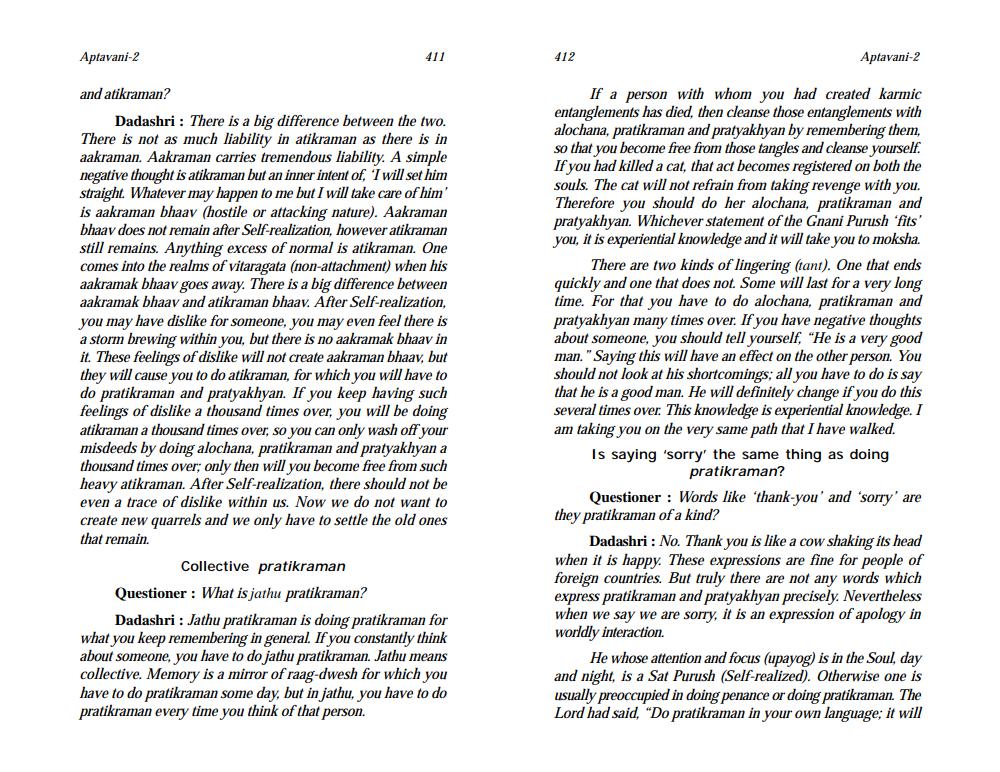________________
Aptavani-2
412
Aptavani-2
and atikraman?
Dadashri : There is a big difference between the two. There is not as much liability in atikraman as there is in aakraman. Aakraman carries tremendous liability. A simple negative thought is atikraman but an inner intent of, 'I will set him straight. Whatever may happen to me but I will take care of him' is aakraman bhaav (hostile or attacking nature). Aakraman bhaav does not remain after Self-realization, however atikraman still remains. Anything excess of normal is atikraman. One comes into the realms of vitaragata (non-attachment) when his aakramak bhaav goes away. There is a big difference between aakramak bhaav and atikraman bhaav. After Self-realization, you may have dislike for someone, you may even feel there is a storm brewing within you, but there is no aakramak bhaav in it. These feelings of dislike will not create aakraman bhaav, but they will cause you to do atikraman, for which you will have to do pratikraman and pratyakhyan. If you keep having such feelings of dislike a thousand times over, you will be doing atikraman a thousand times over, so you can only wash off your misdeeds by doing alochana, pratikraman and pratyakhyan a thousand times over; only then will you become free from such heavy atikraman. After Self-realization, there should not be even a trace of dislike within us. Now we do not want to create new quarrels and we only have to settle the old ones that remain.
Collective pratikraman Questioner : What is jathu pratikraman?
Dadashri : Jathu pratikraman is doing pratikraman for what you keep remembering in general. If you constantly think about someone, you have to do jathu pratikraman. Jathu means collective. Memory is a mirror of raag-dwesh for which you have to do pratikraman some day, but in jathu, you have to do pratikraman every time you think of that person.
If a person with whom you had created karmic entanglements has died, then cleanse those entanglements with alochana, pratikraman and pratyakhyan by remembering them, so that you become free from those tangles and cleanse yourself If you had killed a cat, that act becomes registered on both the souls. The cat will not refrain from taking revenge with you. Therefore you should do her alochana, pratikraman and pratyakhyan. Whichever statement of the Gnani Purush 'fits' you, it is experiential knowledge and it will take you to moksha.
There are two kinds of lingering (tant). One that ends quickly and one that does not. Some will last for a very long time. For that you have to do alochana, pratikraman and pratyakhyan many times over. If you have negative thoughts about someone, you should tell yourself, "He is a very good man. "Saying this will have an effect on the other person. You should not look at his shortcomings, all you have to do is say that he is a good man. He will definitely change if you do this several times over. This knowledge is experiential knowledge. I am taking you on the very same path that I have walked. Is saying 'sorry' the same thing as doing
pratikraman? Questioner : Words like 'thank-you' and 'sorry' are they pratikraman of a kind?
Dadashri : No. Thank you is like a cow shaking its head when it is happy. These expressions are fine for people of foreign countries. But truly there are not any words which express pratikraman and pratyakhyan precisely. Nevertheless when we say we are sorry, it is an expression of apology in worldly interaction.
He whose attention and focus (upayog) is in the Soul, day and night, is a Sat Purush (Self-realized). Otherwise one is usually preoccupied in doing penance or doing pratikraman. The Lord had said, "Do pratikraman in your own language; it will




